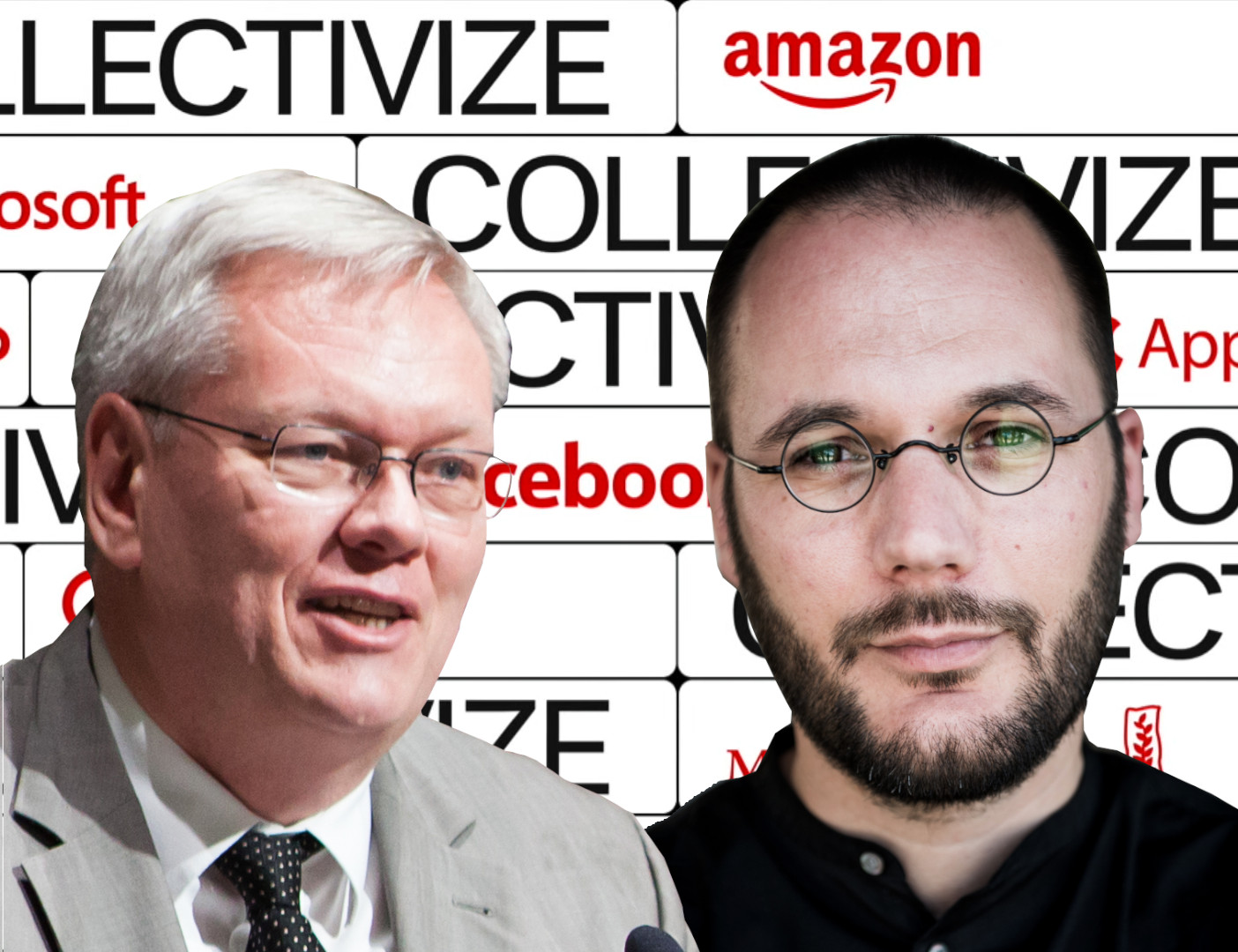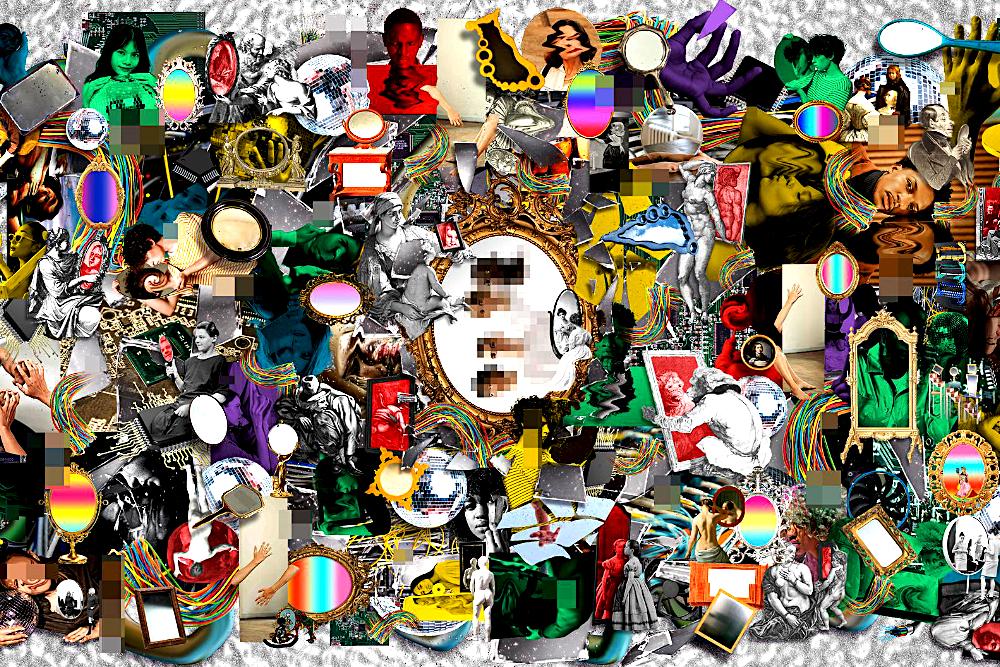Este artigo está publicado em Português e Inglês. Podes ver a versão portuguesa aqui.
–
The meaning of an artist’s work, or its purpose in the world, are fundamentally abstract questions. With the variety of proposals that we come across in this area, it’s difficult to find boundaries for what art is and, following the same logic, we quickly realize that little of what we believe as static or changeless really is.
Words are our way of relating to the world, and even the most common concepts are nothing but norms we have found and agreed that give a certain meaning to life in society. If a State seems to be an immaculate institutional figure, remember that many of those we know today did not exist for a couple of decades and that there are peoples, such as the Kurds, who despite their geographic concentration, live without being recognized as one. The stability with which we live our lives has put us to sleep regarding the mutability of all these concepts, regarding the possibility of reorganization inherent to life on earth in its global assumption. But as much as we nowadays take most of our rights as granted, not long ago they were just a dream.
Thus, in order to remain attentive and, above all, aware of the course of history, which slides through our own fingers, we need to confront ourselves with questions that force us to leave the world’s usual conceptual framework. That is what Jonas Staal and Jan Fermon suggest to us in their most recent artistic work, which is, simultaneously, n their most recent work which is, simultaneously, a paradigmatic legal battle. Jonas is a Dutch artist who has always revealed a tendency to disrupt institutional concepts as an artistic practice in his body of work. Throughout his career, along with installations dealing with contemporary propaganda, he created alternative parliaments, organized summits in Rojava, Kurdistan, and proposed art institutions as site of political organization. Jan is a Belgian progressive lawyer from the International Association of Democratic Lawyers, renowned among peers for the defense of humanitarian causes and marginalized people.
The two joined in a project commissioned by HAU Hebbel am Ufer Berlin – a theater and performance center based in Berlin, which aims to go well beyond the limits reserved for artistic practice. The artist and the lawyer shared knowledge in a 33-page accusation against Facebook that they intend to send to the United Nations Human Rights Council. In the indictment, they expose their understanding that Facebook violates a number of fundamental rights, such as the right to self-determination, and demand that Facebook should be collectivized. In an interview with Shifter, they explain what they want to say and do with this project and how all the ideas were articulated until the final result, Collectivize Facebook.
Last March, you presented, in a live-streamed conference, your project to Collectivize Facebook. First of all, how did it come to life and what motivated you to spend a whole year writing the indictment?
Jan Fermon (JF): I know Jonas for about a decade. I experienced how his various artistic creations and initiatives are related to questions of how society develops, to political matters in the broad meaning of that word. For Jonas artistic creativity is closely related to human emancipation and that means to preserve and broaden fundamental rights. Fundamental rights are nothing else than the result of past emancipatory movements, and new rights to be conquered will be the result of present and future emancipatory movements. Defending and broadening fundamental rights, people’s rights and human rights, individual and collective, social, economic, civil and political rights is also the main goal of my work as a progressive lawyer. That has brought us together in the past and did again now in relation to the Facebook complaint.
Jonas Staal (JS): Jan was involved in several of the alternative parliaments for stateless and blacklisted organizations that I developed through my artistic and political organization New World Summit, both as a legal representative that defended Jose Maria Sison, founder of the Communist Party of the Philippines, from blacklisting, and as a chair in our gatherings. We ran into each other several times, from Manila to Syrian Kurdistan, because we were working with the same movements. Much of my work as an artist has been about creating artworks in the form of alternative institutions, from artworks-as-parliaments to artworks-as-training-camps, but I believe we also need to struggle over existing corporate infrastructures. To me it was clear that Jan was the right collaborator, not just because his entire life has been dedicated to issues of social justice, but also because he has the imaginative capacity and legal tools to challenge forms of oppression at their root, relating to forms of ownership. It took us time though, both to develop a fundamental legal line of argumentation, but also in deciding which court would have the agency to act on our indictment on a meaningful scale.

Why did you choose Facebook instead of the other companies mentioned in the presentation like Uber, Alphabet, etc?
JF: Facebook stands as an example of a model in which people, both on a collective and on an individual level, are more and more deprived from the instruments and levers that allow them to choose and shape their future. And that “right to self-determination” is precisely the mother of all fundamental rights. Some have described data as “the new oil”. We chose Facebook because it plays such a major role in the data-driven economy. Data grows into a role like finance. Finance capital and data-corporations seem to develop parallel dominant positions in the worldwide capitalist system. But through the example of Facebook what is at stake is of course the incompatibility with fundamental rights of the capitalist system, where extreme minorities control and use in their own interests the instruments necessary to assure fundamental rights to the other 99 % of the population.
JS: Our collective action lawsuit against Facebook proposes a model. One that does not merely try to demand for “reforms” of the transnational corporation, but aims to cooperatize its very infrastructures instead. We need to challenge dominant forms of ownership, and not just by nationalizing Facebook, but by turning it into a new transnational cooperative. We now find ourselves in the coronavirus crisis, in which we have become even more dependent on transnational corporations, such as Facebook and Amazon. To ensure this crisis becomes transformative, we need to work towards a new model of distributing power, beyond the state and the corporation alike. Facebook is our first case, but we hope to join forces and extend the collective action lawsuit to other trillion-dollar companies that should be recognized and collectivized as public domains as well.
As far as I know, this is the first indictment to suggest a collectivization. Do you feel this is a sign of the unprecedented dimension and preponderance of private companies?
JS: We are far from the first to challenge the hegemonic role of Facebook and other trillion-dollar companies. The European Union’s General Data Protection Regulation would not have come into being without the work of activists, civil society platforms and progressive political parties. But we don’t want transnational corporations to “correct” their behaviors, we want to challenge the criminal dimensions of their very structure of ownership. This is also why Jan proposed to focus on the way the organizational model of Facebook fundamentally infringes on the human right to self-determination, which is the foundation of our indictment. We are beyond the time of reform, now must be a moment of transformation.
Nowadays common people tend to see Facebook and Google like portals for the world wide web instead of understanding the basics and the protocols of the web. Do you see this as some kind of digital colonialism, where the colonizer pretends to provide everything that is needed in exchange for unsolicited exploitation, in this case, the user’s Data?
JS: Yes, I would agree to that assessment. We discuss this specifically as Facebook representing a form of forced labor through data extraction. And Facebook’s attempts to provide supposed “free internet” in the form of its Internet.org and Free Basics campaigns in the Global South, are engineered as such to guarantee, in a neo-colonial kind of way, that the largest possible communities of data workers become structurally dependent on the platform. In internet.org and Free Basics, Facebook is the internet, as only Facebook related services are provided without any payment.
JF: Facebook creates a new form of alienation where the result of a productive activity consisting in the creation of value under the form of data, is simply confiscated without any compensation by Facebook. Facebook users, individually and collectively, lose in this way completely control over the product of their labor and, different from a “normal” situation under capitalism, do not get any form of compensation. That is why we refer to a neo-feudal situation. Such a mechanism is of course highly detrimental to all fundamental economic and social rights. And like colonialism deprived the colonized people of control over their resources, the control by Facebook over the Internet in the Global South deprives the people of control over the new raw material: data.
Isn’t this a sign of the advertising’s triumph over social movements – such as P2P Foundation or Free Software Foundation – and digital literacy?
JS: Well, terms like “equality” and “rights” are relatively new, and would have been considered in themselves utopian not very long ago. The fact that we are still able to imagine that forms of ownership and collective governance could be different, is the inheritance of popular mass movements of past and present. And today, as various states are enrolling coronavirus monitoring apps, data activists have gathered enormous civil backing when it comes to the growing awareness over data exploitation and surveillance. But the struggle ahead is about ensuring that creative commons and open source infrastructures in a cooperative sense, become the norm, and not the exception that critically assesses the work of corporate conglomerates from the margins.
Since people can’t individually monetize their data, how can we show them that it is financially valuable and exploitable by corporates?
JS: By emphasizing: you worked for Facebook, they never paid you: they owe you. It starts from emphasizing clear individual interest for the precarious classes. But in that individual interest – working without pay – the larger threats to our collective wellbeing can be identified. The reduction of the state into a subsidizer of private companies, the mass precarization of workers in zero-hour contracts, perpetual erosion of civil rights through mass corporate and state surveillance, and the increasing authoritarian turn.
Given the current situation, with people isolating and social distancing, waiting on government orders and relying on corporate social media to maintain their social relations, do you think that socialization and/or sociability may be one of the main victims of Covid-19 losing to individualism?
JS: Global capitalism always wanted us to be atomized, but indeed, now our daily social choreographies have met that agenda. But social distancing does not mean we cannot assemble and find intimacies through other forms. Collectivization is a form of assembly, of assembling a system differently, to be nearer to one another through equal distribution of wealth. Nearness does not always have to be bodily, there is also such a thing as infrastructural intimacy, a closeness that can only be felt through egalitarian practices. And never have there been so many reborn socialists in the world as today to support such an agenda: those who might have thought capitalism would turn them top dogs one day, now demand universal health care, well paid care workers and cleaners, basic income. I call that the “red virus” that has manifested simultaneously to the biological propagation of the coronavirus. The red virus is a virus of egalitarian ideas, and I hope our campaign can help propagate its mass contamination.
Public and private ownership are relatively common in capitalist societies. On the other hand, collectives and cooperatives aren’t, oftentimes being associated and/or connected to collectivist countries or mythological moments of history. Having that said, the internet and most of the technology available today completely shifted the paradigm of creation and consumption (of content, services, products and experiences)– do you think that this means it is time to discover new forms of ownership? How do you see new technologies like blockchain and their potential to support these new forms?
JF: The core question is indeed “Who holds decision-power over the instruments necessary for peoples and humankind as a whole to secure their right to development?” Every political and economic system has laid down the answer to that question in legal rules. Under the capitalist system the basic rule is that those instruments are owned and controlled by those who provide capital, excluding all others in society. But the reality from capitalists as individual owners of specific production means such as it existed in the 19th century, has evolved in many cases into collective ownership by capital providers through shareholding and investment funds. Capitalism carries within it the seeds of collectivization. Let us take that logic further and collectivize ownership and control over these essential instruments further. Of course, such new types of ownership and control over public goods will require new legal rules.
JS: Blockchain has often operated as a necessary tool of commonization, most certainly in the domain of culture, from the advent of Napster to the various Torrent platforms operational today. It has opened a new cultural paradigm, expressed in the form of creative commons, which is the standard in my artistic practice as well. You could say that blockchain is an answer to the question of ownership through decentralized networks, but if we look at its effect in cryptocurrency for example, ideological benefits tend to lean towards libertarian and crypto-fascist factions. This of course has much to do with the question who has access to technological infrastructure that provides mining capability in the first place. I met one of the co-founders of Bitcoin when I was working in the Kurdish autonomous region in Northern-Syria, where he hoped to introduce cryptocurrency into the revolution. But for its technological capacity and internet access, the region is largely dependent on surrounding states, various of which it is in armed conflict with. So here again comes the question, who has the means to ownership in order to create “new” forms of ownership? The global south is mined for technology to equip the global north with cryptocurrency mining capacity. Nothing trickles down if it’s not collectivized from the bottom up.
How would this ‘translate’ in real life – where would it take place and in what form? Can you imagine how it will work – who would be responsible for maintenance, hosting, curation, moderation, algorithmic design, etc? What would happen to their employees around the world?
JS: I can easily imagine a collectivized Facebook as a transnational cooperative, in which data is no longer stored, information encrypted to structurally avoid state or corporate surveillance, advertisement banned, and algorithms composed by users. I can see the first voting event of 2,5 billion active users for a new social contract for the collectivized Facebook, and I imagine the first gathering of the people’s councils that represent our members in the respective states where Facebook is active – for as long as we’re still dealing with “states” in the first place. But the plan Jan and I have is to organize “pre-trials”, in which we read and discuss the indictment to convince people to join our lawsuit as co-claimants, and where we invite “witnesses of the future” to share their ideas on the governance of this transnational cooperative once we have won our case at the UN Human Rights Council. We have ideas of how it could be done, but that only succeeds when they’re joined with that of others, many of which have worked on questions of common ownership of data and decentralized networks for far longer than we have. A collectivized Facebook has to be demanded collectively, planned collectively, and governed collectively.
JF: And that means also that the new legal rules organizing such new types of collective ownership I mentioned earlier will have to be invented and established collectively. Since the middle of the 19th century people all over the world have tried to imagine such new types of collective ownership. They ran into the extreme aggressiveness of the old ruling order which waged wars, organized aggressions, blockades, military coups, imposed sanctions etc. Under such pressure many of these experiments failed. But they also contain a lot of valuable knowledge, both positive and negative experiences that can inspire the next attempt.
What do you think about the US proposals to break-up Big Tech?
JF: The point is that the internal development laws of capitalism tend towards the creation of ever bigger monopolies. The idea of breaking up monopolies in whatever field of activity of the economy is based on the illusion of a return to the capitalism of the early days when a lot of competing entities existed. The domination of finance capital as a result of the increasing need for capital to conduct particular productive activities, the socialization of the production involving ever increasing numbers of workers in the creation of a specific product, has put an end to that early stage. The datafication of the economy will strengthen that tendency towards monopolization. Instead of trying to put steps back in the direction of bygone early capitalism we suggest taking a step forward and to not only, as capitalism has already done, collectivize or socialize the work but also the control over the resources and the instruments to create wealth and assure development.
Besides these giant networks, there are others called federative networks who do respect collective property principles. Shouldn’t we be joining/powering up these instead of criticizing/disassembling the ones like Facebook?
JS: In our first online presentation of the collective action lawsuit, Jan made the point that we work on a two line strategy: a cultural battle on one hand, that relies on popular mass movements towards transforming our common understanding of ownership, and a legal battle on the other, that pushes the outer boundaries of existing institutions. The social struggle and the legal struggle in this context, are part of the same effort. And our current and past work with transnational bodies, ranging from the International Association of Democratic Lawyers, of which Jan is the General Secretary, to the Democracy in Europe Movement 2025 (DiEM25) and European Alternatives, is an inherent part of this effort.
Transnational tech companies are among the biggest ones today, and with, as mentioned in the indictment, no democratic oversight. Do you think that the UN should have a more active way of regulating them, their operations, their conduct, their product, service and/or experience and ultimately their brand? Or do you think that it would need to be too big to oversight companies with this dimension and user base?
JF: The Charter of the United Nations starts with “We people of the world…”. It expresses, together with the Universal Declaration of Human Rights adopted shortly after, the common will and aspirations of the people who had fought and defeated fascism. The United Nations Organization is the far from perfect organizational expression of the principles of the Charter. The UNO does have some very progressive aspects to it. The principle of “sovereign equality of nations” finds its expression in the fact that every country, big or small, rich or poor has an equal vote in the General Assembly. But powerful nations have attempted gradually to marginalize the UNO itself by creating international financial institutions such as the World Bank and the IMF. And within the UN they attempted to marginalize the General Assembly or to manipulate it. The US e.g. has literally bought on many occasions the votes of poor countries. So, some UN bodies can play a useful role in the transition towards societies that are based on collective ownership and the realization of the collective interest. But beyond this the UN can of course not govern or oversee future collectivized transnationals. The international instruments and bodies that are needed in this future perspective will be the result of our collective building of a new international democratic economic order.
JS: If the UN Human Rights Council would recognize our claim that Facebook is to be considered a public domain, this will be an important precedent for national court cases against Facebook everywhere, as these would from that moment be structured fundamentally on the idea that while Facebook is not in common ownership, it should be. It would provide a cultural paradigm shift, and enable new political and legal agency towards collectivization.

Since you, Jonas, are an artist and this project was presented in a theater, it will probably be understood as a performative act, existing within the performance landscape. Do you think that this is a byproduct of the current cultural landscape where artists tend to be seen in a contemplative, ephemeral and perhaps even self-referential way? Also, do you think that everything that deviates from the norm tends to be assimilated as purely performative?
JS: For me, the theater is a space where we work on the collective imagination. Changing the material conditions of the world we live in, and working towards a common imaginary of what that world could or should be, are not in opposition: they are mutually supportive and essential to one another. And indeed, when political and cultural ideas deviate from our criminal “normal”, they tend to be framed as “merely art,” or as “utopian.” The fact that democratic socialists, like Sanders or Ocasio-Cortez, are framed as naïve for their most modest demands of universal healthcare or a minimum wage of $15, is symptomatic for the successful propaganda operation underlying the global capitalist doctrine as the only reasonable option available. Now that the likes of Sanders and Corbyn have been put aside as unfeasible, the struggle ahead, I believe, is not to moderate our demands: these demands never went far enough in the first place, and that is why they did not succeed. The role of art, here, is to insist on a relentless imaginary of possible worlds, which are as real as our collective desire and willingness to practice them into being. I would be very curious though how, from a perspective of progressive law, Jan would respond to this question.
JF: Law is in general conservative. Law regulates the established order and aims at perpetuating that order. “Justice” and “law” are therefore not synonyms. An unjust order will be protected by the laws of that order. However, “law” does offer possibilities for emancipatory action. And human emancipation is of course about collective imagination and a common imaginary of what that world could or should be. Progressive “shoots” of law are always the result of revolutionary movements and periods, the French revolution, the socialist revolutionary movements in Europe after WWI, the anti-fascist resistance, the anti-colonial wars …. During such periods, the established order is weakened and sometimes tries to gain control over the situation by making concessions. The law “deviates” then from its normal function to protect the status quo. But that movement is not purely “performative” in the sense that it is only a purely formal matter. Around these progressive “shoots” of law new struggles will develop. The representatives of the established order will try to undo the concessions they made, to empty the achievements of their substance. Emancipatory forces will engage in that struggle to protect the past successes and to use them as a lever to conquer new rights. A progressive law practice is therefore aimed at assisting the people in that struggle and to give shape to the rules that would govern what Jonas calls “possible worlds.”
Facebook recently announced an Oversight Board, a council that will help Facebook make decisions and discuss content policies, formed by people from outside the company – such as ex-ministers, lawyers, journalists… How do you see this initiative? Is it possible for a company with such power to create a mechanism of self-regulation?
JS: I think this is an example of the increasing power of multinational corporations, which can stage their own judiciary systems and supposed structures of oversight, without public institutions intervening or evaluating the outcomes of such procedures. Essentially, it shows a turn from the role of government as a mechanism of control over private institutions, to private institutions adopting roles that formally belonged to the state. Think of former Google CEO Eric Schmidt, who has been at a marathon lobby for his full-scale surveillance projects such as the smart city, to become the norm in monitoring citizens health and movement as governments attempt to reopen their economies in the coronavirus outbreak. But the phrasing he chooses, namely that this lobby should be considered as a “public service” to compensate for derelict public institutions, makes the transformation towards the specter of corporate governance all the more clear.
Some news outlets, such as BBC or SIC in Portugal, have referred to this Oversight Board as a Facebook’s ‘Supreme Court’. Yet it has no democratic oversight. Isn’t this some kind of recognition of a Facebook sovereignty over any democratic state?
JS: I would agree to that analysis. This is what Manuel Beltrán has referred to as the “Facebook State,” that further includes its attempt to produce its own currency, the Libra – something on which Jan can elaborate in relation to our indictment.
JF: First, I would like to make a small correction. The right to sovereignty belongs to peoples, not to states. Peoples should be able to build the (state)institutions of their choice as part of their right to sovereignty. States are (supposed to be) a collective instrument to exercise sovereignty. But monopolistic transnationals like Facebook seize and try to always grab more control over some of the levers which states have to materialize people’s sovereignty. Apart from private judicial mechanism Facebook has also plans to create an instrument to infiltrate gradually and subsequently seize control over the decision-making process regarding the monetary policies. These are of course essential to exercise sovereignty in the economic and social field. The plans to create the Libra, a new crypto currency controlled by Facebook, illustrates this perfectly. Of course, such a currency will be used at first on a limited scale in transactions directly related to Facebook. But knowing Facebook’s hegemonic politics, it will not be long before an expansion into online commerce in general will be attempted. Such plans therefore are an imminent and serious threat to the ability of peoples and individuals to decide on their own future.






You must be logged in to post a comment.